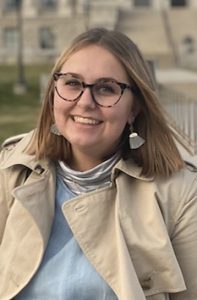
After taking Radical Quiet. from Professor Phillip Bimstein, student Sydney Kincart used her experience in the class as well as an interview with Bimstein to write an article for The Daily Utah Chronicle.

Kincart: Find Your Quiet
By: Sydney Kincart, Print Chief, Opinion Writer
The return to in-person classes and activities for fall semester hit me at full force. I went from months of staying at home and seeing only those I live with to attending three in-person classes and multiple meetings a day. Throughout the semester, I found myself and my peers overwhelmed with so many demands because there wasn’t a gradual reopening for us. I struggle to find time by myself for relaxation.
During distanced learning, I learned to embrace quiet. I developed a habit of journaling, reading regularly and spending time alone. But in August 2021, I lost all of this almost instantly. As we conclude this semester and get ready to start spring semester, we should take this time not only to relax, but to embrace silence.
Our world has grown louder. Noise pollution is an ongoing issue, hurting the health of people and wildlife on land and in the sea. Noise pollution includes traffic sounds, construction, workplace sounds, loud music, fireworks and other loud and continuous sounds. Living on campus, I frequently hear helicopters going to the hospital, the TRAX and events at the stadium.
We interact with noise pollution daily. But, we also tend to seek out noise. I seldom do homework without listening to music or watching a TV show. While I drive, I listen to music or call friends. It’s easier for me to be around noise instead of alone with my thoughts. Some people even fall asleep to white noise. Noise surrounds us with notifications reminding us of all the work that needs to get done. Dealing with our thoughts can be scary at times, so it’s much easier to rely on physical noise as a distraction.
But this constant presence of noise can cause a lot of harm. Residents of loud areas can lose over three years of life due “to some combination of ailments” caused by everyday loud noises. Noise most notably interrupts sleep, weakening memory, creativity, judgment and psychomotor skills. Continuous noise triggers our bodies’ acute stress response, which raises our blood pressure and heart rate, and causes health problems. Not only does our physical health suffer, but so does our mental health. Noise is linked with increased anxiety and depression.
Professor Phillip Bimstein teaches a course called “Radical Quiet” at the University of Utah Honors College. This course focuses on the concept of quiet and was integral in changing my perspective on quiet. In an interview, he explained that noise “crowds out your opportunity to have other thoughts and could create stress.”
Embracing quiet allows us to “tolerate more noise because you could have a better relationship with it and not necessarily think of it as something that must be avoided. You can sort of let it be what it is,” said Bimstein. We control our relationship with noise, so we must reframe our relationship with noise going forward. “The course Radical Quiet isn’t always about being quiet. It’s about finding a quiet space even amidst noise,” he said.
We need to find our own forms of quiet in this noisy world. Last year I read Jenny Oddell’s “How to Do Nothing: Resisting the Attention Economy,” as a part of the Radical Quiet course. In the book, Oddell describes a rose garden that she frequents because it allows her to think clearly. Although it’s hard to completely escape noise, we should intentionally find places with limited noise. I have two parks that I frequent by myself to clear my head. In hard times, those places mean so much to me. We all need to find our own rose garden.
Meditation practice also brings a much-needed sense of calmness to an otherwise chaotic life. Research shows that just five minutes of meditation a day can reduce stress and boost brain functions. Professor Bimstein explained that one of the biggest obstacles to finding quiet as a student is overcoming the idea that we must always move on to the next thing. He urges students to acknowledge their doubt, anger and self-judgment. This helps us move closer towards finding our quiet.
As we go into winter break, take this break for yourself. It’s difficult since our lives to this point condition us to keep going — no matter our lack of wellbeing. It’s perfectly fine that we struggle to find our quiet, but we shouldn’t let the difficulty keep us from starting to find peace through quiet.
reposted from The Daily Utah Chronicle
